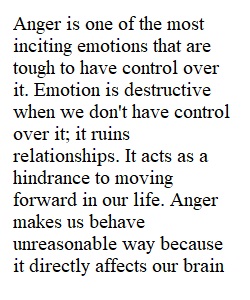


Q Rhetorical Analysis Essay: This essay assignment asks you to describe an issue, event or idea and make a claim about an issue or event or idea. Making a claim means that you will evaluate the idea, issue or event. The assignment also asks that you consider an alternative or opposing viewpoint. Essay Topics: Choose ONE to write about: Writer James Barrie claims that, “Temper is a weapon we hold by the blade.” This vivid metaphor invites us to understand the danger that a burst of temper or outburst of anger causes to the person who becomes uncontrollably angry. We can all imagine the personal damage that would happen if anyone grasped a sharp knife by the blade. The knife, meant to harm the object of anger, instead harms the one who is angry. Choose this topic if you would like to write about a time when you witnessed or experienced a display of anger or temper that ended up hurting the angry person. If the anger also hurt others, that should be part of the essay’s discussion. 2. Think of a time when you believed a statement or report that turned out to be inaccurate or misleading. Make a claim that evaluates and analyzes consequences and ethical issues of your having been deceived in this way. 3. People sometimes say, “The end justifies the means.” This statement claims that the goal is so important that anything you do to obtain that goal is okay to do. For example, in Macbeth, the play we are reading this semester, the main character has great ambition and this leads him to crime and violence. So in his mind, his goals or ambitions justify what he does to fulfill that ambition. Another example is if your loved one needed medicine to survive, what actions would be justified to obtain that medicine? Think of when you have lived by this idea and the results or where you see others living this way and make a claim about the results or implications of practicing this philosophy. Method Form A Claim: Choose an topic and begin to think about it by writing down your ideas Write down what you want to prove—your claim. It could be something like: “I didn’t think about the consequences of yelling at the business manager about the mice problem in the girls’ bathroom. I just lost my temper. I learned that obtaining all the facts before demanding action is vital." Ask yourself what information you need to prove your claim. For example: if you are writing about a deception, find out what was said, and what the true facts are. This will require some research, maybe talking to others who were involved. Keep a record of all the sources that you read/consult in writing. This essay doesn't require outside sources, but if you consult them, you must cite sources. List the ways that your claim can be discussed using the rhetorical devices: logos (facts), pathos (appeal to emotion) and ethos (establishing credibility). Write The Introduction: The introduction should provide a general explanation of the event or topic. Give enough information so that the situation or idea is clearly, but generally presented (save details for the main part of the paper) to establish ethos (your credibility) and to evoke pathos In the introduction explain key terms. Finish the introduction with a statement of your claim. What do you intend to prove? How will your prove it (main points or categories) Explain why this idea is important. What universal human value does it speak to? A successful first draft will: Present an introduction that explains the experience or situation. States a claim. Introduces the categories or ways that the paper will prove the claim. These are sometimes called "main points." Analyze the reasons for the actions or ideas. Evaluate the implications, results or effects of the situation and idea. Use logos, pathos and ethos to evaluate, analyze and prove the claim. Identify one concession or counterarguments and include it in a statement or paragraph before the end of the essay. Reiterate the claim with a final thought about all the paper has proven. Follow college standard writing requirements (see Canvas for more info): Implement MLA style.Guide to MLA style (Links to an external site.) Module 2: Rhetoric Resource- MLA Format In this paper you may use first person pronouns (I, me, we, us, our, ours). Choose one verb tense and use it throughout the paper. The paragraphs in the main part of the paper should use the rhetorical appeals of logos, pathos and ethos. Underline or highlight the use of logos, pathos and ethos in this first draft. Provide a color key if you highlight. Example Logos Pathos Ethos The claim or thesis must be discussed, developed and proved in each paragraph. Remember to quote and cite any sources you consulted Cite by parenthetical in text citations. (See Canvas for instructions and reminders) If you consult outside sources, include a Works Cited page. The paper should be 1200-1500 words. The conclusion can be as short as one sentence, but it should be strong and meaningful. Remember to run the spell and grammar check on your word processor before submitting.
View Related Questions